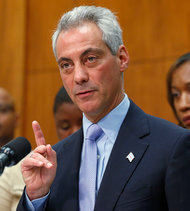Simple math says the Emanuel administration has a slim chance of winning a reversal of a court order striking down a law intended to save two city pension funds from insolvency.
Two members of the Illinois Supreme Court—Charles Freeman and Anne Burke—have recused themselves from deciding whether changes to the retirement plans violate the pension protection clause of the Illinois Constitution.
That leaves five members of the court to consider the fate of a 2014 law that cut the benefits and increased the contributions of the members of the pension plans. A Cook County Circuit judge found the law unconstitutional on July 24.
A 3-2 decision isn’t enough for the administration to prevail because the constitution requires four votes to reverse a lower court decision.
One of the five justices is Lloyd Karmeier, who wrote the unanimous May 8 opinion that struck down the state’s pension law. He seemingly would be a tough vote for the city to win.
That means the administration has to persuade all four remaining justices to its side.
COUNTING QUESTIONS
Studies show that the lawyer who receives the most questions during oral arguments tends to lose, even without considering the substance of the questions.
That’s an ominous sign for the Emanuel administration, because during the Nov. 18 argument the justices put 17 questions to Corporation Counsel Stephen Patton, compared with two for lawyers representing city workers and retirees, according to Kirk Jenkins, a Chicago-based appellate lawyer who tracks the court.
“That would suggest the city is looking at some pretty long odds,” said Jenkins, a partner in law firm Sedgwick. “When you are—this isn’t really a word—outquestioned by that large a margin, the winning percentage drops substantially.”
Putting aside the lopsided margin, the party that simply received the most questions won just 27 percent of all split decisions between 2008 and 2014, according to a study by Jenkins of civil cases in the state Supreme Court.
Interpreting the justices’ questions to determine how they might vote can be unreliable, Jenkins notes.
Even so, the questions of Justices Robert Thomas and Mary Jane Theis “suggested a fair amount of skepticism about the city’s position,” Jenkins said. “They didn’t see this as a dramatically different issue than ‘In re Pension Reform Litigation,'” the court’s landmark decision in May.
Karmeier and Justice Thomas Kilbride did not pose any questions during the argument. Chief Justice Rita Garman asked one question of each side.
A spokesman for the city’s Law Department said, “We cannot speculate on how individual judges or the court will rule.”
BURKE’S DILEMMA
The Emanuel administration appealed after Circuit Judge Rita Novak ruled against the city July 24. Freeman recused himself Aug. 13, when without explanation he did not participate in court orders scheduling the case for argument. A court spokesman told Crain’s that Freeman declined to participate because he is the surviving spouse of a city worker and receives an annuity from the Municipal Employees’ Annuity and Benefit Fund of Chicago, one of the retirement plans involved in the case.
Freeman wrote the 2014 opinion last year that barred changes to the retirement health care benefits of state workers. That might mean he would have been a hard vote for the city to win. Burke was the sole dissenter.
Burke dropped out of the city pension case without explanation Sept. 15, when the court issued another routine order. Her recusal came three days after Crain’s published a story raising questions about whether she also had a conflict of interest because her husband, Ald. Edward Burke, 14th, is covered by the same fund. Justice Burke declined to comment for that story.
A court spokeswoman now says Justice Burke informed her colleagues of her decision Sept. 2. That was nearly two weeks after Crain’s started putting questions to the court spokesman about her potential conflict of interest in light of Freeman’s decision not to participate.


